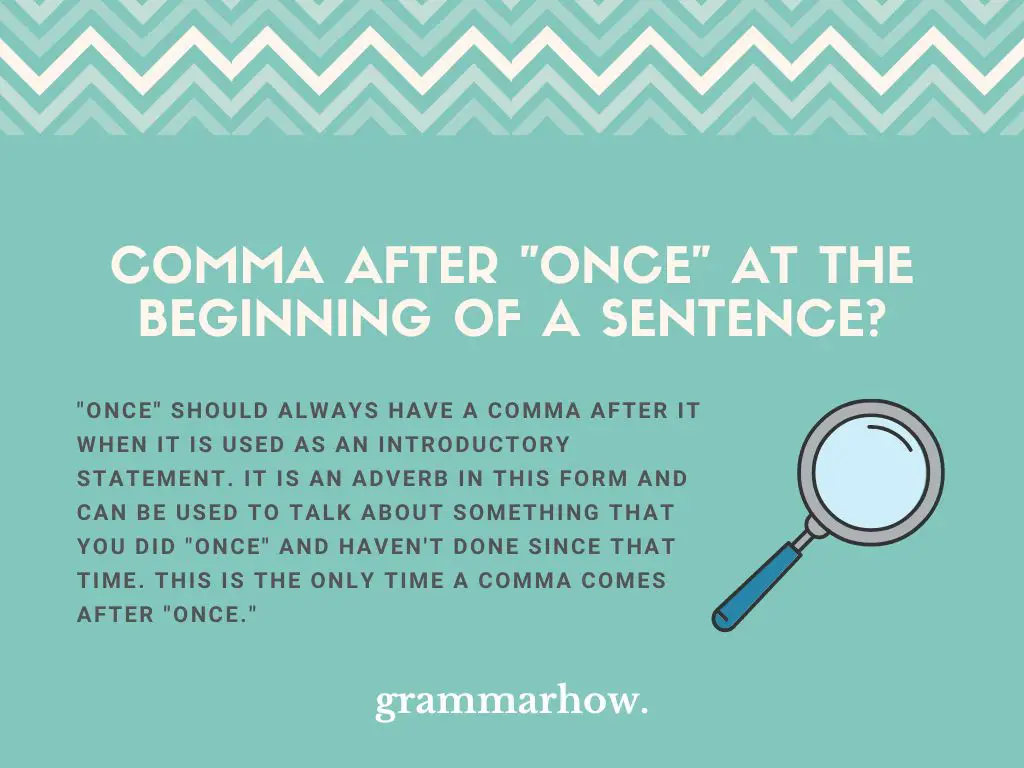“Once” can be used in a variety of ways. It is an adverb, conjunction, and noun, all at the same time. It would help to know more about it and when punctuation rules apply. This article will look into placing a comma after “once” at the beginning of a sentence.
Comma After “Once” at the Beginning of a Sentence?
“Once” should always have a comma after it when it is used as an introductory statement. It is an adverb in this form and can be used to talk about something that you did “once” and haven’t done since that time. This is the only time a comma comes after “once.”

A comma should only be placed directly after once when it’s the only word in the introductory clause. Here’s what we mean by that:
- Once, I made a cake.
This example shows that you made a cake once, but you haven’t decided to repeat that since.
If you add any extra words after “once” in the introductory clause, the comma no longer comes after “once.” It instead has to wait until the clause has ended, like this:
- Once upon a time, a princess lived in a castle.
When to Use Comma After “Once”
You can place a comma after “once” when it’s the first word in a sentence. If you are using it as an introductory clause, you can place a comma straight after it as long as you are talking about something that you did once before and haven’t done since.
It’s not all that common to use “once” on its own like this. Nevertheless, it is still grammatically correct.
Here are some examples to show you how to place a comma after “once:”
- Once, there was this man in the same building as me. I didn’t know how to talk to him at all.
- Once, she told me all about her past. I’m not sure if she meant to tell me about it, though.
- Once, there was something wrong with her. Those times have gone by, and she’s much more comfortable.
- Once, I was told a story that stuck with me. Maybe I’ll tell you the same story someday!
- Once, I arrived too early for an event, so they kicked me out and didn’t let me return.
When to Use Comma Before “Once”
There is never an appropriate time to place a comma before “once.” Since “once” acts as a conjunction or adverb, you cannot include it as part of a parenthetical element. It is only ever included as part of the same clause as the sentence.
To help demonstrate what we mean, you can take the following example:
- Sharon did that once upon a time because she wanted to.
Here, “once upon a time” is included in the main sentence without any commas. Technically, you could remove “once upon a time,” and the sentence would still make sense:
- Sharon did that because she wanted to.
However, that does not mean you can place commas on either side of “once upon a time.” Since “once upon a time” is a prepositional phrase, it does not get enclosed by commas.
The following is incorrect:
- Incorrect: Sharon did that, once upon a time, because she wanted to.
When to Use “Once” Without Comma
Most of the time, you do not need to punctuate “once.” It only comes with a comma when it is an introductory clause on its own. If you use it as a conjunction or adverb in any other situation, you do not need to include a comma.
It might help to go through some examples to demonstrate what it looks like with no commas:
- Can you text me once you get there? I’d really like to make sure you’re okay.
- I’m not going to talk about it once it’s over. I don’t want to remember these times.
- Once I said something to her, she decided to correct her ways for the good of the people.
- Whatever you said once is irrelevant now. You are not the same person you were.
- I’m not going to tell you that I only did it once. I did it more than that!
Final Thoughts
“Once” is rarely punctuated because it is most commonly used as a conjunction. However, you might find that a comma comes after it when you start a sentence with it. This is common because it acts as an introductory adverbial clause, and the comma breaks the flow of the sentence.

Martin holds a Master’s degree in Finance and International Business. He has six years of experience in professional communication with clients, executives, and colleagues. Furthermore, he has teaching experience from Aarhus University. Martin has been featured as an expert in communication and teaching on Forbes and Shopify. Read more about Martin here.
